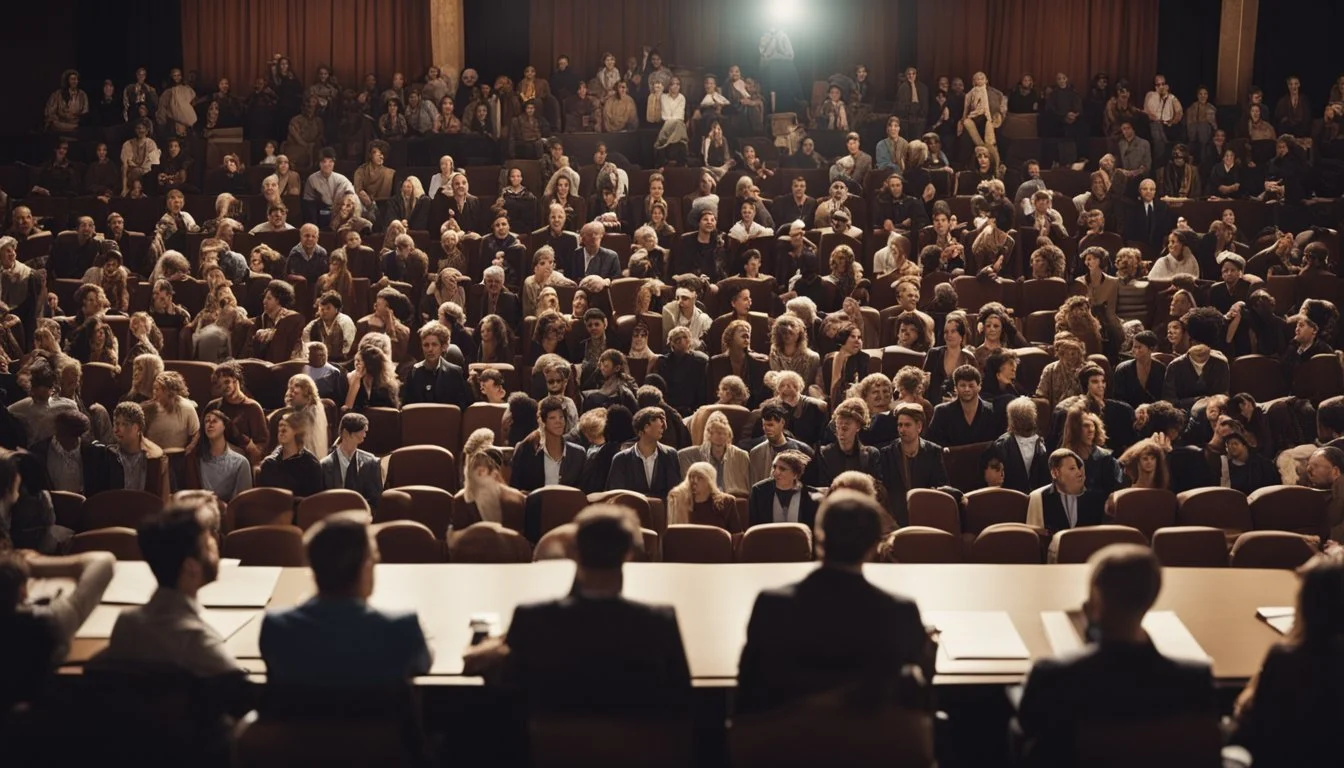Fahrenheit 911 Documentary Sparks Distribution Battle and Censorship Debates
Michael Moore's controversial documentary "Fahrenheit 9/11" ignited a fierce debate upon its release in 2004. The film's distribution faced significant obstacles, raising questions about political censorship and the limits of free speech in America.
The battle over "Fahrenheit 9/11" exposed deep divisions in American society regarding the Iraq War and the Bush administration's response to 9/11. Supporters hailed the film as a necessary critique of government policies, while detractors accused Moore of spreading misinformation and propaganda.
The distribution challenges faced by "Fahrenheit 9/11" highlighted the complex relationship between politics, media, and corporate interests in the United States. Some theaters refused to show the film, citing concerns about its controversial content. This led to accusations of politically motivated censorship and sparked debates about the role of media conglomerates in shaping public discourse.
Background of 'Fahrenheit 9/11'
'Fahrenheit 9/11' emerged as a controversial documentary film that scrutinized the Bush administration's actions following the September 11 attacks. The film sparked intense debate and faced distribution challenges due to its politically charged content.
Creation of the Documentary
Michael Moore directed and produced 'Fahrenheit 9/11' in 2004. The film aimed to critically examine President George W. Bush's response to the 9/11 terrorist attacks and the subsequent Iraq War. Moore utilized a combination of interviews, archival footage, and his trademark satirical style to construct the narrative.
The documentary's title is a play on Ray Bradbury's novel 'Fahrenheit 451', alluding to the temperature at which book paper burns. In this context, Moore implies a burning of truth or morality.
Michael Moore's Motivation
Moore's primary motivation for creating 'Fahrenheit 9/11' was to influence the 2004 U.S. presidential election. He openly stated that the film's ending would take place on November 2, Election Day 2004.
The filmmaker sought to expose what he perceived as failures and deceptions of the Bush administration. Moore's goal was to inform the American public about issues he believed were overlooked or misrepresented by mainstream media.
His approach combined investigative journalism with provocative filmmaking techniques to evoke strong emotional responses from viewers.
Controversies and Critical Reception
'Fahrenheit 9/11' generated significant controversy before, during, and after its release. Critics accused Moore of manipulating facts and using emotional appeals to sway audiences.
The film faced distribution challenges, with some theaters refusing to show it due to its political content. Despite these obstacles, it became the highest-grossing documentary at that time.
Reviews were mixed. Some critics, like Kenneth Turan of the Los Angeles Times, praised the film's power to provoke discussion. Others, including conservative commentators, criticized it as biased propaganda.
The documentary's portrayal of the Bush administration's actions and the Iraq War sparked heated debates. It fueled discussions about media's role in wartime and the limits of political discourse in film.
Political and Social Context
The political and social landscape of post-9/11 America shaped the reception and impact of "Fahrenheit 9/11". Public sentiment, government policies, and media narratives intertwined to create a complex environment for the film's release.
Post-9/11 America
The September 11 attacks profoundly altered American society. Fear and uncertainty permeated daily life. Heightened security measures became the norm at airports, government buildings, and public spaces.
Patriotism surged, with American flags displayed prominently nationwide. Many citizens rallied behind the government's call for unity and decisive action against terrorism.
The attacks also sparked increased discrimination against Muslim Americans and those perceived to be of Middle Eastern descent. This led to heated debates about civil liberties and national security.
The Bush Era Policies
President George W. Bush's administration responded to 9/11 with sweeping policy changes. The Patriot Act expanded government surveillance powers, raising concerns about privacy rights.
The "War on Terror" became a central focus, leading to military interventions in Afghanistan and Iraq. These actions divided public opinion and strained international alliances.
Domestic policies shifted as well. Increased funding for homeland security and defense impacted budget allocations for other sectors like education and healthcare.
Terrorism and Media Narratives
Media coverage of terrorism intensified after 9/11. News outlets devoted extensive airtime to threat levels, security measures, and potential attacks.
This constant focus shaped public perception and political discourse. Some argued it fueled unnecessary fear, while others saw it as crucial awareness.
The Bush administration's relationship with the media became contentious. Critics accused the government of manipulating information to justify its policies, particularly regarding the Iraq War.
Social media's emergence began to challenge traditional news sources, offering new platforms for dissenting voices and alternative narratives about terrorism and national security.
The Filmmaking Journey
Michael Moore's "Fahrenheit 9/11" emerged as a groundbreaking political documentary, employing innovative techniques and drawing comparisons to influential works of the past. The film garnered significant acclaim and accolades, solidifying its place in cinematic history.
Cinematic Techniques
Moore utilized a mix of archival footage, interviews, and personal narration to craft his narrative. He employed juxtaposition to create stark contrasts, often pairing serious political content with humorous or ironic elements. The film's editing style was fast-paced and dynamic, keeping viewers engaged throughout its runtime.
Moore's use of music played a crucial role in setting the tone and evoking emotional responses. He incorporated a diverse soundtrack, ranging from patriotic anthems to satirical songs, enhancing the film's impact.
The director's on-camera presence served as a guide for the audience, offering commentary and occasionally confronting subjects directly.
Comparisons to Past Works
"Fahrenheit 9/11" drew comparisons to propaganda films of the past, particularly those of Leni Riefenstahl. While Riefenstahl's works glorified Nazi Germany, Moore's film took a critical stance against the Bush administration.
Some critics likened Moore's approach to that of muckraking journalists from the early 20th century, exposing perceived government wrongdoings. The film's title referenced Ray Bradbury's "Fahrenheit 451," suggesting a parallel between book burning and the suppression of information.
Moore's previous works, such as "Roger & Me" and "Bowling for Columbine," established his signature style of confrontational documentaries. "Fahrenheit 9/11" built upon these techniques while focusing on a larger political scale.
Achievements and Accolades
"Fahrenheit 9/11" achieved unprecedented success for a documentary film. It won the Palme d'Or at the 2004 Cannes Film Festival, becoming the first documentary to receive this honor since 1956.
The film grossed over $222 million worldwide, setting a record for the highest-grossing documentary of all time. It sparked intense debate and discussion across political lines, becoming a cultural phenomenon.
Critics praised Moore's filmmaking skills, with many lauding the film's ability to provoke thought and emotion. However, some questioned its objectivity and accuracy, labeling Moore as a propagandist.
"Fahrenheit 9/11" received numerous awards, including the People's Choice Award for Favorite Motion Picture. Its commercial and critical success paved the way for future political documentaries to reach wider audiences.
Distributor Debates and Box Office Performance
The release of "Fahrenheit 9/11" faced significant distribution challenges but ultimately achieved major box office success. This sparked controversy and debate about the film's impact and political influence.
Distribution Hurdles
Disney initially refused to distribute "Fahrenheit 9/11" through its Miramax subsidiary. This decision sparked controversy and accusations of political censorship.
Miramax co-founders Bob and Harvey Weinstein ultimately purchased the rights from Disney. They partnered with Lions Gate Films and IFC Films to distribute the documentary.
The distribution battle garnered significant media attention. It raised questions about corporate influence over politically sensitive content.
Public and Critical Response
"Fahrenheit 9/11" received widespread public interest upon release. It became the highest-grossing documentary of all time.
Critics were divided. Some praised the film's provocative critique of the Bush administration. Others accused Moore of bias and factual inaccuracies.
The documentary sparked heated debates about its portrayal of post-9/11 politics. It became a major talking point during the 2004 presidential election campaign.
Financial Impact
"Fahrenheit 9/11" shattered box office records for a documentary. It grossed over $222 million worldwide.
The film's financial success demonstrated significant public appetite for political documentaries. It opened new doors for the genre in mainstream cinema.
The Wall Street Journal reported on the film's unexpected commercial triumph. This highlighted its cultural impact beyond typical documentary audiences.
"Fahrenheit 9/11" proved controversial documentaries could be highly profitable. This influenced future investment in politically charged non-fiction films.
Censorship and Freedom of Expression
Censorship and freedom of expression are contentious issues in modern democracies, especially when it comes to controversial media content. The balance between protecting free speech and addressing potential societal harms remains a complex challenge.
The Power of Media Conglomerates
Media conglomerates wield significant influence over content distribution. Their decisions can shape public discourse and access to information. Large corporations often control multiple media outlets, giving them the ability to amplify or suppress certain viewpoints.
This concentration of power raises concerns about diversity of opinion and the potential for corporate censorship. Critics argue that economic interests may override journalistic integrity or public interest. Some point to instances where media giants have refused to distribute controversial content, effectively limiting its reach.
NPR, as a public broadcaster, offers an alternative model. It aims to provide diverse perspectives while maintaining editorial independence from commercial pressures.
Legal and Ethical Challenges
The First Amendment protects freedom of speech in the United States, but its application in the digital age is complex. Social media platforms and online content distributors face difficult decisions about content moderation.
Donald Trump's suspension from major social media platforms sparked debate about the limits of free speech online. Supporters argued it was necessary to prevent the spread of misinformation, while critics saw it as politically motivated censorship.
Christopher Hitchens, a vocal advocate for free speech, argued that offensive ideas should be countered with better arguments, not silenced. He believed that censorship ultimately harms society by stifling debate and intellectual growth.
Courts continue to grapple with these issues, balancing free expression against other societal concerns. The legal framework struggles to keep pace with rapidly evolving technology and communication channels.
Impact on Politics and Society
Michael Moore's "Fahrenheit 9/11" sparked intense debates and shaped public discourse around the War on Terror. The film's provocative approach influenced views on government policies and media coverage in the post-9/11 era.
Influence on Public Opinion
"Fahrenheit 9/11" reached a wide audience, becoming the highest-grossing documentary at the time. Its release during the 2004 presidential campaign amplified its impact on political discussions.
The film challenged the Bush administration's justifications for the Wars in Afghanistan and Iraq. It presented footage of U.S. soldiers questioning their mission and Iraqis suffering from the conflict.
Many viewers found the documentary eye-opening, prompting them to reconsider their stance on foreign policy. Critics argued it oversimplified complex issues and used emotional manipulation.
Critique of Media and Government
Moore's film criticized mainstream media for not questioning government narratives about 9/11 and subsequent wars. It highlighted connections between the Bush family and Saudi elites, suggesting conflicts of interest.
The documentary accused news outlets of self-censorship and failing to investigate thoroughly. It portrayed the government as exploiting fear to push its agenda.
This critique resonated with those skeptical of official accounts. It fueled debates about media independence and government transparency in times of crisis.
Legacy of 'Fahrenheit 9/11'
The film's impact extended beyond its initial release. It inspired political activism among supporters and galvanized opponents to produce counter-documentaries.
"Fahrenheit 9/11" set new standards for politically charged documentaries. Its commercial success showed the potential for such films to reach mainstream audiences.
The documentary remains a reference point in discussions about war, media, and politics. Its techniques and arguments continue to influence political filmmaking and public discourse on government accountability.
Analysis and Perspectives
The distribution battle surrounding 'Fahrenheit 9/11' sparked intense debate about political censorship, media influence, and the role of documentary filmmaking. This controversy highlighted key tensions between free speech, corporate interests, and public discourse during a politically charged time.
Critical Insights
'Fahrenheit 9/11' faced significant opposition from media conglomerates and political groups. Critics accused Moore of manipulating facts and using emotional appeals to sway viewers. Supporters argued the film exposed important truths about the Bush administration and the War in Afghanistan.
The documentary's portrayal of U.S. Armed Forces in Iraq and Afghanistan drew both praise and criticism. Some viewed it as an honest depiction of soldiers' experiences, while others saw it as disrespectful to troops.
Moore's examination of the National Guard and President Bush's military service record became a flashpoint. Journalists debated the accuracy and fairness of these claims throughout the film's release.
Comparative Analysis
Compared to previous political documentaries, 'Fahrenheit 9/11' achieved unprecedented commercial success and cultural impact. Its box office performance rivaled that of mainstream entertainment films.
The movie's release strategy differed from typical documentaries. Moore and his team pursued wide theatrical distribution to maximize audience reach, challenging industry norms for non-fiction films.
'Fahrenheit 9/11' employed more aggressive marketing tactics than most documentaries. This approach sparked debates about the line between journalism and entertainment in documentary filmmaking.
The Role of Documentary in Society
'Fahrenheit 9/11' reignited discussions about documentaries as tools for political discourse and social change. It demonstrated the potential for non-fiction films to shape public opinion and influence electoral politics.
The film's controversy underscored tensions between documentarians' freedom of expression and concerns about factual accuracy. It prompted calls for greater scrutiny of claims made in political documentaries.
Moore's work challenged traditional notions of objectivity in documentary filmmaking. It raised questions about the balance between advocacy and journalistic integrity in non-fiction storytelling.
The film's depiction of the Taliban and the War in Afghanistan sparked debates about how documentaries should address complex geopolitical issues. Critics and supporters alike grappled with the responsibilities of filmmakers in presenting nuanced perspectives on global conflicts.
Contemporary Relevance and Discussions
"Fahrenheit 9/11" continues to spark debates about media's role in shaping political narratives and public opinion. The film's critique of the Bush administration's response to the Sept. 11 attacks and the War in Iraq remains relevant in today's political landscape.
The Documentary's Resonance Today
Michael Moore's "Fahrenheit 9/11" still resonates with audiences two decades after its release. The film's examination of fear-based politics and media manipulation echoes in current discussions about disinformation and political polarization.
Recent events like the Trump presidency and ongoing conflicts in the Middle East have reignited interest in the documentary's themes. Many viewers draw parallels between the film's portrayal of post-9/11 America and today's political climate.
The movie's critique of war profiteering and government secrecy remains pertinent amid debates over military spending and transparency. YouTube and social media platforms have given "Fahrenheit 9/11" a second life, introducing it to new generations of viewers.
Media's Responsibility in a Changing World
"Fahrenheit 9/11" raised important questions about media's role in democracy that continue to be relevant. The film's controversial distribution highlighted concerns about corporate influence on information dissemination.
Today, discussions focus on social media's impact on news consumption and political discourse. The rise of fake news and echo chambers has intensified debates about media responsibility and fact-checking.
Journalists and filmmakers grapple with balancing objectivity and advocacy in an era of increasing political division. The documentary's approach to challenging official narratives remains a topic of debate in journalism ethics courses.
Media literacy has become a crucial skill as audiences navigate complex information landscapes. "Fahrenheit 9/11" serves as a case study in critically examining media narratives and motivations behind news coverage.






